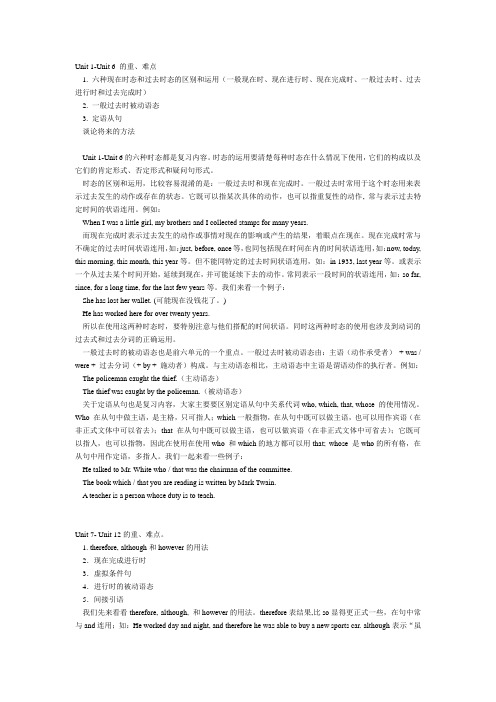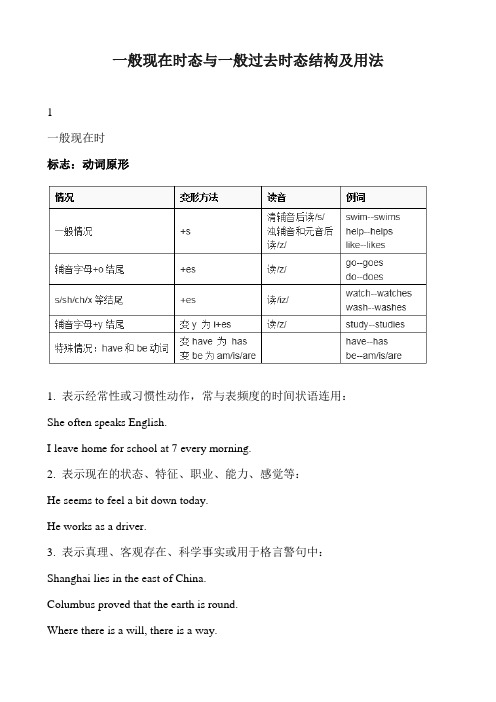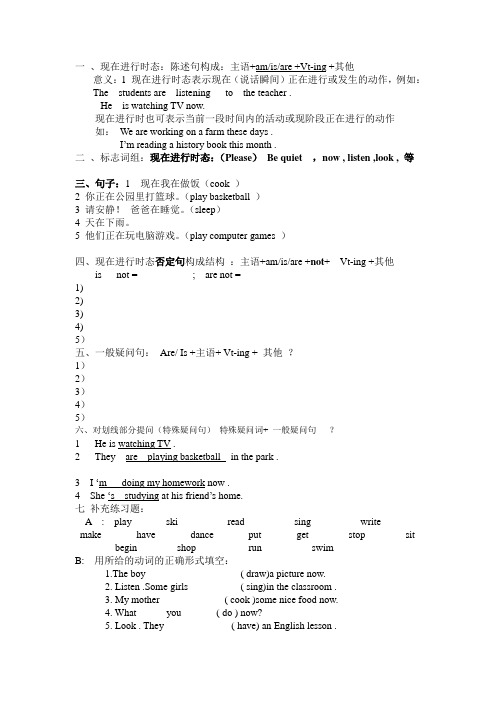过去时和现在时态
六种现在时态和过去时态的区别和运用(一般现在时

Unit 1-Unit 6 的重、难点1. 六种现在时态和过去时态的区别和运用(一般现在时、现在进行时、现在完成时、一般过去时、过去进行时和过去完成时)2. 一般过去时被动语态3. 定语从句谈论将来的方法Unit 1-Unit 6的六种时态都是复习内容。
时态的运用要清楚每种时态在什么情况下使用,它们的构成以及它们的肯定形式、否定形式和疑问句形式。
时态的区别和运用,比较容易混淆的是:一般过去时和现在完成时。
一般过去时常用于这个时态用来表示过去发生的动作或存在的状态。
它既可以指某次具体的动作,也可以指重复性的动作, 常与表示过去特定时间的状语连用。
例如:When I was a little girl, my brothers and I collected stamps for many years.而现在完成时表示过去发生的动作或事情对现在的影响或产生的结果,着眼点在现在。
现在完成时常与不确定的过去时间状语连用,如:just, before, once等,也同包括现在时间在内的时间状语连用,如:now, today, this morning, this month, this year等。
但不能同特定的过去时间状语连用,如:in 1933, last year等。
或表示一个从过去某个时间开始,延续到现在,并可能延续下去的动作。
常同表示一段时间的状语连用,如:so far, since, for a long time, for the last few years等。
我们来看一个例子:She has lost her wallet. (可能现在没钱花了。
)He has worked here for over twenty years.所以在使用这两种时态时,要特别注意与他们搭配的时间状语。
同时这两种时态的使用也涉及到动词的过去式和过去分词的正确运用。
一般过去时的被动语态也是前六单元的一个重点。
一般现在时态与一般过去时态结构及用法

一般现在时态与一般过去时态结构及用法1一般现在时标志:动词原形1. 表示经常性或习惯性动作,常与表频度的时间状语连用:She often speaks English.I leave home for school at 7 every morning.2. 表示现在的状态、特征、职业、能力、感觉等:He seems to feel a bit down today.He works as a driver.3. 表示真理、客观存在、科学事实或用于格言警句中:Shanghai lies in the east of China.Columbus proved that the earth is round.Where there is a will, there is a way.4. 表示现在瞬间的动作:Here comes the bus!5. 表示将来1) 表按规定、计划、安排将要发生的动作(仅限于某些表示“来、去、动、停、开始、结束、继续”等的趋向动词),可以与表示未来的时间状语搭配使用。
常见的用法是:飞机、火车、轮船、汽车等定期定点运行的交通状况。
如:The next train leaves at 3 o’clock this afternoon.How often does the shuttle bus run?2) 在时间和条件状语从句中常使用一般现在时表示将来发生的事情:When Bill comes (不用will come), ask him to wait for me.I shall go there tomorrow unless I’m too busy.2一般过去时标志:动词过去式*闭音节:元音字母a, e, i, o, u如果发字母本来的音则称为开音节,否则称为闭音节。
1. 表示过去某时所发生的动作或存在的状态,常与表示过去的时间状语连用(e.g. yesterday, this morning, just now, a moment ago, in May, last night / year / week, once upon a time, the other day, before …, when …, in the past等)。
动词时态现在时态和过去时态的区别及应用

动词时态现在时态和过去时态的区别及应用动词的时态是指用来表示动作或状态发生时间的一种语法形式。
在英语中,时态分为现在时态和过去时态,它们在表达方式和用途上有所不同。
以下将详细介绍动词现在时态和过去时态的区别及应用。
一、现在时态现在时态用于描述当前正在进行的动作或者状态,以及客观真理、经常性的习惯等。
1. 一般现在时态一般现在时态表示经常性的动作或者习惯,常用的时间状语词有often(经常)、usually(通常)、always(总是)等。
例如:- I often go to the gym in the morning.(我经常在早上去健身房。
)- He usually takes a walk after dinner.(他通常在晚饭后散步。
)2. 现在进行时态现在进行时态表示目前正在进行的动作,常用的时间状语词有now (现在)、at the moment(此刻)等。
例如:- She is studying for the exam now.(她正在学习考试。
)- They are watching a movie at the moment.(他们正在看电影。
)3. 现在完成时态现在完成时态用于表示过去发生的动作对当前造成的影响或者状态的持续性,常用的时间状语词有recently(最近)、lately(最近)、already(已经)等。
例如:- I have finished my homework.(我已经完成作业了。
)- They have traveled to many countries recently.(他们最近去了很多国家。
)二、过去时态过去时态用来表示在过去某个特定时间发生的动作。
1. 一般过去时态一般过去时态用于过去的某个时间发生的动作,常用的时间状语词有yesterday(昨天)、last week(上周)等。
例如:- I visited my grandparents yesterday.(昨天我去看望了我的祖父母。
英语中的16种时态

时态(Tense)是表示行为、动作和状态在各种时间条件下的动词形式。
因此,当我们说时态结构的时候,指的是相应时态下的动词形式。
英语时态分为16种:一般现在、一般过去、一般将来、过去将来时,以及这四者的进行时、完成时和完成进行时。
1.一般现在时(do/does; is/am/are)①表示现在的情况、状态或特征。
例:He is a student. 他是一个学生。
②表示经常性、习惯性动作。
例:He always helps others. 他总是帮助别人。
③客观事实和普遍真理。
例:The earth moves the sun. 地球绕着太阳转。
④表示一个按规定、计划或安排要发生的动作。
仅限于某些表示“来、去、动、停、开始、结束、继续”等的动词,可以与表示未来时间的状语搭配使用。
常见的用法是:飞机、火车、轮船、汽车等定期定点运行的交通方式。
例:The next train leaves at 3 o'clock this afternoon.下一趟火车今天下午3点开车。
⑤在时间、条件和让步状语从句中经常用一般现在(有时也用现在完成时)表示将的来事情。
(即:主将从现原则)例:I will call you as soon as I arrive at the airport.我一到机场就会给你打电话。
When you have finished the report, I will have waited for about 3 hours.等你完成这份报告的时候,我就已经等了将近3个小时了。
2. 现在进行时(am/is/are doing)①表示此时此刻正在发生的事情。
例:He is listening to the music now. 他现在正在听音乐。
②表示目前一段时间内一直在做的事情,但不一定此时此刻正在做。
例:I am studying computer this term. 这个学期我一直在学习计算机。
英语时态16种

英语时态八种时间时态过去现在过去的过去过去过去的将来现在将来一般did2do1would do4will do3进行be (was/were) doing6be (am/is/are) doing5完成had done8have done71.do: 一般现在时。
一般现在时(do)可以视为do do,前一个do视为助动词(省略),后一个do视为实义动词,二者的变化构成了十六种时态。
2.did: 一般过去时。
一般过去时(did)可以视为did do(did为助动词,do为实义动词,合并为did(实义动词不能省略))。
did是do的过去形式,该变化(do-did(-表示变化))是十六种时态变化的根本规律,故时态可以简化为两类,现在时态(包括1、3、5、9、13、15六种)和过去时态(其他十种)。
3.will do: 一般将来时。
will还可以用shall代替。
do-will。
4.would do: 过去将来时。
即will变成其过去形式would(将will do中的will视为一般现在时(do,见1)中的do,然后变为其过去式did(见2),will do本身的do不变),故严格意义上应称为一般过去将来时。
do-will-would。
5.be (am/is/are) doing: 现在进行时。
严格意义上应称为一般现在进行时。
do-be(助动词be,一般形式am/is/are),实义动词do变为现在分词doing。
6.be (was/were) doing: 过去进行时。
即现在进行时中的be(am/is/are) 变成其过去形式be(was/were),方法同4,be变化,doing不变。
故严格意义上应称为一般过去进行时。
do-be(助动词be,一般形式am/is/are)-be(过去形式was/were),实义动词do变为现在分词doing。
7.have done: 现在完成时。
严格意义上应称为一般现在完成时。
动词时态的全面解析准确运用过去现在和将来时

动词时态的全面解析准确运用过去现在和将来时动词时态的全面解析及准确运用过去、现在和将来时动词时态是英语语法中的一个重要部分,它用来表达动作或状态发生的时间。
正确地运用时态可以使句子更加准确、流畅,并能够有效传达我们所要表达的意思。
本文将对动词时态进行全面解析,并指导如何准确运用过去时、现在时和将来时。
1. 过去时(Past Tense)过去时用于描述已经发生过的动作或状态。
一般过去时表示的是过去某个特定时间发生的动作,例如:I watched a movie last night.(昨晚我看了一部电影。
)He lived in London for five years.(他在伦敦生活了五年。
)除了一般过去时外,过去时还有以下几种形式:1.1 过去进行时(Past Continuous Tense)过去进行时表示过去某一时间正在进行的动作,或过去某一时间段内连续发生的动作,例如:I was watching a movie when she called me.(她给我打电话时,我正在看电影。
)They were playing basketball from 4 pm to 6 pm yesterday.(昨天从下午4点到6点,他们一直在打篮球。
)1.2 过去完成时(Past Perfect Tense)过去完成时表示在过去某个时间之前已经发生的动作,例如:She had already finished her homework before he arrived.(他到之前她已经完成了作业。
)They had known each other for ten years before they got married.(他们在结婚前已经认识了十年。
)1.3 过去完成进行时(Past Perfect Continuous Tense)过去完成进行时表示过去某一时间之前一直在进行的动作,例如:I had been waiting for two hours when the bus finally arrived.(公交车最终到达时,我已经等了两个小时了。
过去时与现在完成时的区别

1. 一般过去时表示过去某个时间发生的事、存在的状态或经常发生的动作。
说话的侧重点只在于陈述一件过去的事情,不强调对"现在"产生的影响。
如:He visited Guilin in 1998.他1998年参观过桂林。
(只说明去桂林的时间)2. 现在完成时表示动作发生在过去,对现在造成了影响或产生了结果。
不与确定的过去时间状语连用。
如:Jill has bought a new computer.吉尔买了一台新电脑。
(着重点是现在有了一台新电脑)3. 两种时态的区分(1)一般过去时的谓语动词用过去式,而现在完成时的谓语基本构成是"助动词have /has +过去分词"。
如:(2)一般过去时通常与表示过去的时间状语连用。
如:yesterday, last week, two years ago, just now, in 2002等;而现在完成时则常与just, already, ever, never等副词和these days, this week, since..., for...等表示一段时间的状语连用。
看看以下的几组句子,有什么区别?①Have you seen the film?(A)Did you see the film?(B)[说明] 你看过这部电影吗?(A)句强调的是被问者对剧情是否了解;(B)句强调的是看这部电影的动作是否发生过,并不强调是否知道其内容。
②How has he done it?(A)How did he do it?(B)[说明]他是怎么做的这件事?(A)句强调的是他做这件事的方式对现在产生了某种影响;(B)句单纯的询问做这件事的方式。
③He has lived in Beijing for 8 years.(A)He lived in Beijing for 8 years.(B)[说明]他在北京住了8年。
(A)句讲的是到目前为止他在北京住了8年,可能还会继续在北京住下去。
现在进行时态和过去进行时态

一、现在进行时态:陈述句构成:主语+am/is/are +Vt-ing +其他意义:1 现在进行时态表示现在(说话瞬间)正在进行或发生的动作,例如:The students are listening to the teacher .He is watching TV now.现在进行时也可表示当前一段时间内的活动或现阶段正在进行的动作如:We are working on a farm these days .I’m reading a history book this month .二、标志词组:现在进行时态:(Please)Be quiet ,now , listen ,look , 等三、句子:1 现在我在做饭(cook )2 你正在公园里打篮球。
(play basketball )3 请安静!爸爸在睡觉。
(sleep)4 天在下雨。
5 他们正在玩电脑游戏。
(play computer games )四、现在进行时态否定句构成结构:主语+am/is/are +not+ Vt-ing +其他is not = ; are not =1)2)3)4)5)五、一般疑问句:Are/ Is +主语+ Vt-ing + 其他?1)2)3)4)5)六、对划线部分提问(特殊疑问句)特殊疑问词+ 一般疑问句?1 He is watching TV .2 They are playing basketball in the park .3 I ‘m doing my homework now .4 She ‘s studying at his friend’s home.七补充练习题:A : play______ ski_________ read_________ sing _________write________ make_______have_______dance_______put_______get________stop________sit_ _______begin________shop__________ run__________swimB: 用所给的动词的正确形式填空:1.The boy __________________ ( draw)a picture now.2. Listen .Some girls __________( sing)in the classroom .3. My mother ____________ ( cook )some nice food now.4. What _____ you ______ ( do ) now?5. Look . They _____________( have) an English lesson .6.They ____________(not ,water) the flowers now.7.Look! the girls ____________(dance )in the classroom .8.What is our granddaughter doing?She _________(listen ) to music.9. It's 5 o'clock now. We ___________(have)supper now10.______Helen__________(wash )clothes? Yes ,she isC、句型转换:1. They are doing housework .(分别改成一般疑问句和否定句)①_______________________________________________②_______________________________________________2.The students are cleaning the classroom . ( 改一般疑问句并作肯定和否定回答)①_______________________________________________②_ ___________________________________③_____________________________第二部分一、过去进行时态:陈述句构成:主语+ was/were +Vt-ing +其他意义:二、标志词组:at this /that time yesterday , at 8 o’clock yesterday; when the rainstorm came 等三句子:1 昨天晚上8点钟他正在淋浴(take a shower )2上星期天这个时候我正在做作业。
- 1、下载文档前请自行甄别文档内容的完整性,平台不提供额外的编辑、内容补充、找答案等附加服务。
- 2、"仅部分预览"的文档,不可在线预览部分如存在完整性等问题,可反馈申请退款(可完整预览的文档不适用该条件!)。
- 3、如文档侵犯您的权益,请联系客服反馈,我们会尽快为您处理(人工客服工作时间:9:00-18:30)。
八年级下英语辅导I.用下列单词的适当形式填空1.We often___________(play) in the playground.2.He _________(get) up at six o’clock.3.__________you _________(brush) your teeth every morning?4.What________________(do) he usually________________(do) after school?5.Danny ________________(study) English, Chinese, maths, science and Art at school.6.Mike sometimes __________(go) to the park with his sister.7.At eight at night, she __________(watch) TV with his parents.8.________ Mike________(read) English every day?9.How many lessons_________your classmates________(have) on Monday?10.What time_________his mother_________(do) the housework?II.改句子1.Do you often play football after school? (改为肯定句)2.Gao Shan’s sister likes playing table tennis (改为否定句)4.She lives in a small town near New York.(改为一般疑问句)5.My dog runs fast.否定句:13.Tom does his homework at home.否定句:一般疑问句:一般过去时练习题1. Last week I read an English book.否定句:__________________________________________一般疑问句:________________________________________肯定/否定回答:____________________________________对划线部分提问:____________________________________2. My brother was in the park just now.否定句:__________________________________________一般疑问句:________________________________________肯定/否定回答:____________________________________对划线部分提问:____________________________________用所给动词的适当形式填空1.Tom and Mary ___________ (come) to China last month.2.Mike _________________(not go) to bed until 12 o’clock last night. So I _______ (get ) up late.3.Mary __________ (read) English yesterday morning.4.There _________ (be) no one here a moment ago.5.I ___________ (call) Mike this morning.6.I listened but ___________ (hear) nothing.7.Tom ___________ (begin) to learn Chinese last year.st week we _________ (pick) many apples on the farm.9.My mother ________________ (not do) housework yesterday.10.She watches TV every evening. But she _______________ (not watch) TV last night.11.________ your father ________ ( go ) to work every day last year?12. —What time _______ you _______ (get) to Beijing yesterday?—We __________ (get) to Beijing at 9:00 in the evening.13.What __________ (make) him cry (哭) just now?st year the teacher ___________ (tell) us that the earth moves around the sun.15.There ____________ a telephone call for you just now. (be)16.There __________ not enough people to pick apples that day. ( be)17.There _____________ any hospitals (医院) in my hometown (家乡) in 1940. ( be not)18.There ____________ enough milk at home last week, wasn’t there?19.Eli ____________ to Japan last week. ( move)20. –When _______ you _________ (come) to China? - Last year.一、选择( ) 1. What they dinner yesterday ?A. do; have forB. did; had forC. did; have forD. were; have for( ) 2. Could you tell me what time the plane ? A. left B. leaves C. leaved D. was leaving ( ) 3. One of us band last month. A. leaves B. leave C. leaved D. left( ) 4. Where your mother born? A. are B. was C. were D. is( ) 5. Do you know why he for class last year?A. was always lateB. always was lateC. is late alwaysD. is always late( ) 6. I got up this morning, so I breakfast and went to school.A. late; didn’t haveB. earl y; didn’t haveC. late; hadn’tD. early; hadn’t( ) 7. It much cold today than it yesterday.A. is; isB. was; wasC. is; wasD. was; is( ) 8. He didn’t come goodbye to us and away.A.say; goB.say; wentC. to say; wentD.to say ; go( ) 9. Her pen was broken. She to a new one.A. wants; buysB. wanted; boughtC. wants; boughtD. wanted; buy( ) 10. I thought the dress really pretty.A. isB. wasC. /D. were( ) 11. I tired now, but it an exciting day.A.am; wasB. was; wasC. was; isD. am; is( ) 12. He said he go to cook dinner for us.A. willB. wouldC. /D. doesn’t( )13. I stayed in the sitting room and my friends all the time.A. talk toB. talkedC. talk aboutD. talked to( )14. She also her in a 1990s style.A.weared; hairB.wore; hairC. wear; hairD. wears; hairs( )15. I went to see you last Saturday, there nobody in the room.A. but; wasB. and; wereC. and; wasD. but; is二、用所给词的适当形式填空1.He put the books away and ____ (go) home.2. The boy is running and ______ (tie) his shoes on the playground.3. My father ______ (buy) a new computer for ________ (I ) yesterday.4. He often _____ (go) to school by bike, but last year he often ___ (walk) to school.5. After she finished ____ (pack) everything, she ____ (go) to bed.6. ---- Who _____ (wash) the plates on the table ? ---- Jenny did.7. ---- When ____ you ___ (see ) the film ― Titanic‖?8. It’s half past eleven now. Jim __ (have) lunch. He ususlly ____ (have) it at this time.9. She ____ (write) to Jill last month. She ___ (write) to him next time.10. The students _____ (stop) talking when their teacher came up.三阅读理解Jack is a twenty-year-old young man. Two years ago, when he finished middle school, he found work in a shop. Usually he works until ten o'clock in the evening. He is very tired when he gets home. After a quick supper he goes to bed and soon falls asleep. His grandma who lives downstairs is satisfied with (满意) him.One day, on his way home, he met Mary. They were both happy. He asked the girl to his house, she agreed happily. He bought some fruit and drinks for her. And they talked about their school, teachers, classmates and their future (未来). They talked for a long time.―Have a look at your watch, please,‖ said the girl. ―What time is it now?‖―Sorry, something is wrong with my watch,‖ said Jack. ―Where's yours?‖―I left it at home.‖Jack thought for a moment and found a way. He began to stamp his foot on the floor, ―Bang! Bang! Bang!‖The sound woke his grandma up. The old woman shouted downstairs, ―It's twelve o'clock in the night, Jack. Why are you still jumping upstairs?‖1. Jack was ________ when he finished middle schoolA. sixteenB. eighteenC. twentyD. fifteen2. The old woman is satisfied with Jack because ________.A. he's her grandsonB. he's cleverC. he can keep quietD. he gets home on time3. From the story, we can know that Mary is Jack's ________.A. classmateB. colleague (同事)C. auntD. wife4. The word ―stamp‖ in the story means ______ in Chinese.A. 盖印B. 跺C. 贴邮票D. 承认5. Jack stamped his foot on the floor in order (为了) ________.A. to wake his grandma upB. to make his grandma angryC. that his grandma was going to tell him the timeD. that his grandma was going to buy him a watch。
